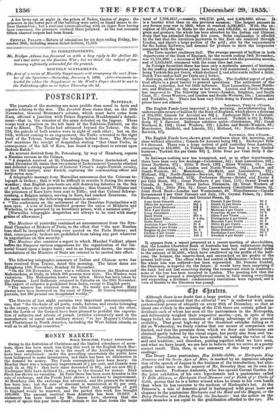POSTSCRIPT.
SATURDAY.
The journals of the morning are more prolific than usual in facts and reports relating to the war. The Dwalide .Russe states that, on the 20th November, General Brummer's column, which must have come from Kars, effected a junction with Prince Bagration Moukhranski's detach- ment—that is, the remains of the army defeated on the Ingour. These troops took a position on the left bank of the Tskbenis-Tskhale on the road to Khoni. The Turks had advanced beyond the Tekour. On the 22d, the patrols of both armies were in sight of each other ; but on the 24th, without coming to an engagement, the Turks retreated to the right bank of the Tekour, breaking the bridges behind them. The Morning Post mentions the receipt of despatches stating "that Omar Pasha in consequence of the fall of Kars, has found it expedient to retreat upon Kedont-Kaleh."
An account derived from St. Petersburg, by way of Hamburg, reports a Russian success in the Crimea.
"A despatch received at St. Petersburg from Prince Gortschakoff, and dated December 20, states that two sotnias of Tschernomori, Cossacks attacked and defeated a strong squadron of General Vivian's Anglo-Turkish cavalry, on the 16th instant, near Kertch, capturing the commanding-officer and forty-seven men." A telegraphic message from Marseilles announces that the Crimean te- legraph is broken ; that it will be difficult to reunite it during the stormy weather ; that English gun-boats are still destroying fisheries in the Sea of Azoff, where the ice presents no obstacles ; that General Williams and the prisoners of Kars have been sent to Tiflis; and that Colonel Schwar- xenberg, a Belgian subject, serving in Kars, had reached Erzeroum. On the same authority the following statement is made-
• "The conferences on the settlement of the Danubian Principalities will soon open. A note of Lord Stratford proposes the union of Moldavia and Wallachia, to be governed by an hereditary prince, with a national army." [Marseilles telegraphic despatches are always to be read with many grains of allowance.]


























 Previous page
Previous page